Click to read the article in Turkish
The ninth hearing of the Kobanî trial continued at Sincan Prison Campus yesterday (February 10).
Some 108 members of the Peoples' Democratic Party (HDP), including its former co-chairs, executives and MPs, are accused of inciting the deadly 2014 protests after ISIS attacked on Kobanî, a Kurdish town in Syria.
At the hearing, the court board began to take statements of plaintiffs before the defendants' and their attorneys' statements were completed despite objections that such a practice was against the procedures, Mesopotamia Agency (MA) reported. However, the plaintiffs did not bring charges against the defendants.
"I don't know the defendants but..."
One of the plaintiffs, Mustafa Akbulut, who is also in prison for being a member of the "Fetullahist Terrorist Organization" (FETÖ), said, "We were attacked with Molotov cocktails. As a police officer, I'm staying in prison. I was sentenced because of FETÖ, but no one should see me as a terrorist. I have applied to the Constitutional Court about my innocence."
When the presiding judge asked him whether he would bring charges against the defendants and whether he would participate in the trial. "I don't know the defendants, but if they are against the state, I want to participate," said the officer.
After plaintiff statements, Selahattin Demirtaş, former HDP co-chair and a defendant in the case, requested to ask a question to Akbulut.
"The plaintiff has stated that he has been arrested for five years, that he has been under stress and explained his reason for participating in the trial. Does the plaintiff think the action against him in Silopi was carried out by our instructions?"
Akbulut then changed his statement, saying he would not bring charges against those in the courtroom but against those who rolled his car over.
Erhan Dönmez, another imprisoned "plaintiff," said his car was damaged during the protests. "But the state covered our losses, so I'm not bringing charges against them. I previously gave a statement about this issue at the Bakırköy 2nd Heavy Penal Court."
Bayram Güven, who is also serving a prison term and whose shop in Tarsus, Mersin, was burned down during the protests, said, "I had filed a lawsuit regarding the events that happened on October 4-5. The evidence is in the case file. I'm a plaintiff, but I'm conflicted about the justice of the state. My shop burned down and the state gave just 10,000 lira to me. I don't know where to apply. I don't know the people who burned my shop."
"I am pressing charges against all HDP executives because HDP plans these events", he said.
Mahsuni Karaman, a defense attorney, asked Güven what crime he was convicted of. After he did not answer, the attorney said, "Why don't you say that you are convicted of sexual offenses?"
Speaking after that, defendant Ayla Akat Ata said, "I'm standing trial as an instigator, but my tweets were posted on October 6-7. However, the events in Tarsus happened on October 4-5. Why are you pressing charges against us? You didn't even see our face."
No "plaintiffs" were left
After statements of other plaintiffs, Güven took the floor again, saying that he felt regret after Ata's statement. "I don't want innocent people to receive sentences with the statement I gave."
Twelve other plaintiffs, all of whom are imprisoned, also said that they would not press charges against the HDP members. Some of them said the damage to their properties during the protests was covered by the state.
Therefore, no plaintiffs were left in the case.
From the Kobanî indictmentThe Ankara Chief Public Prosecutor's Office prepared an indictment regarding the Kobanî protests that took place on October 6-8, 2014. 108 people, including the arrested former Co-Chair of the Peoples' Democratic Party (HDP) Selahattin Demirtaş, were among the "suspects". The indictment seeks the punishment of all suspects on the charges of "disrupting the unity and territorial integrity of the state", "killing for 37 times, "attempted killing for 31 times", "burning the flag" and "violating the Law on Protecting Atatürk." Prepared by the Terror Crimes Investigation Bureau of the Ankara Chief Public Prosecutor's Office, the indictment was sent to the Ankara 22nd Heavy Penal Court. The court accepted the indictment on January 7, 2021. The names of all defendants: Figen Yüksekdağ, Sebahat Tuncel, Selahattin Demirtaş, Selma Irmak, Sırrı Süreyya Önder, Gülfer Akkaya, Gülser Yıldırım, Gültan Kışanak, Ahmet Türk, Ali Ürküt, Alp Altınörs, Altan Tan, Ayhan Bilgen, Nazmi Gür, Ayla Akat Ata, Aysel Tuğluk, İbrahim Binici, Ayşe Yağcı, Nezir Çakan, Pervin Oduncu, Meryem Adıbelli, Mesut Bağcık, Bircan Yorulmaz, Bülent Barmaksız, Can Memiş, Cihan Erdal, Berfin Özgü Köse, Günay Kubilay, Dilek Yağlı, Emine Ayna, Emine Beyza Üstün, Mehmet Hatip Dicle, Ertuğrul Kürkçü, Yurdusev Özsökmenler, Arife Köse, Ayfer Kordu, Aynur Aşan, Ayşe Tonğuç, Azime Yılmaz, Bayram Yılmaz, Bergüzar Dumlu, Cemil Bayık, Ceylan Bağrıyanık, Cihan Ekin, Demir Çelik, Duran Kalkan, Elif Yıldırım, Emine Tekas, Emine Temel, Emrullah Cin, Engin Karaaslan, Enver Güngör, Ercan Arslan, Fatma Şenpınar, Fehman Hüseyin, Ferhat Aksu, Filis Arslan, Filiz Duman, Gönül Tepe, Gülseren Törün, Gülten Alataş, Gülüşan Eksen, Gülüzar Tural, Güzel İmecik, Hacire Ateş, Hatice Altınışık, Hülya Oran, İsmail Özden, İsmail Şengül, Kamuran Yüksek, Layika Gültekin, Leyla Söğüt Aydeniz, Mahmut Dora, Mazhar Öztürk, Mazlum Tekdağ, Abdulselam Demirkıran, Mehmet Taş, Mehmet Tören, Menafi Bayazit, Mızgın Arı, Murat Karayılan, Mustafa Karasu, Muzaffer Ayata, Nazlı Taşpınar, Neşe Baltaş, Nihal Ay, Nuriye Kesbir, Remzi Kartal, Rıza Altun, Ruken Karagöz, Sabiha Onar, Sabri Ok, Salih Akdoğan, Salih Müslüm Muhammed, Salman Kurtulan, Sara Aktaş, Sibel Akdeniz, Şenay Oruç, Ünal Ahmet Çelen, Yahya Figan, Yasemin Becerekli, Yusuf Koyuncu, Yüksel Baran, Zeki Çelik, Zeynep Karaman, Zeynep Ölbeci, Zübeyir Aydar. |
About Kobanî protestsIn September 2014, ISIS, which controlled a large territory in Syria at the time, launched an offensive to Kobanî, a Kurdish town in northern Syria, near the country's border with Turkey. In late September, a group of people went to Suruç, a town neighboring Kobanî in the predominantly Kurdish city of Urfa, and attempted to cross the border. Police prevented them, using tear gas and rubber bullets. Pictures allegedly showing ISIS militia crossing into Syria were published on the same days. Also, President Recep Tayyip Erdoğan made statements at the time, indicating that they equated the PKK with ISIS. While the wounded coming from Kobanî were kept waiting on the border, the wounded from ISIS were treated at hospitals, according to news reports. Several news reports were reported in the press, saying "Kobanî fell." These news reports were denied every time. After the HDP made a call to take to the streets against a possible massacre in Kobanî, thousands of people protested in Kurdish-majority provinces as well as Ankara and İstanbul. While left parties also supported these protests, deaths also occurred with the onset of police violence. Street conflicts ensued. 42 people lost their lives from October 6 to 12, 2014. According to a report by the Human Rights Association (İHD), 46 people died, 682 people were wounded and 323 people were arrested in the protests held between September 7 and 12, 2014. As reported by the AA, 31 people lost their lives, 221 citizens and 139 police officers were wounded. |
(AEK/VK)





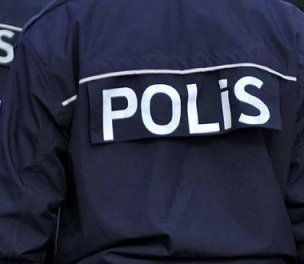
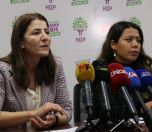
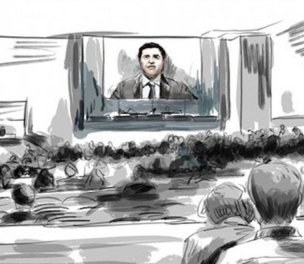
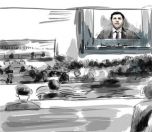
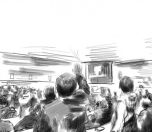
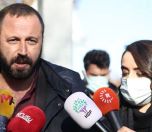
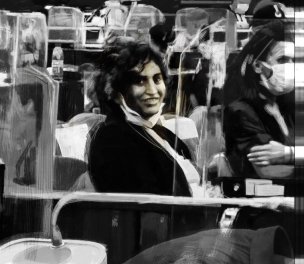
as.jpg)
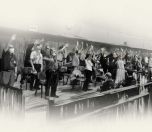
-132.jpg)